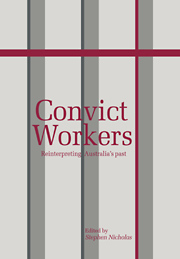Book contents
- Frontmatter
- Contents
- List of Tables and Figures
- Foreword
- Preface
- PART ONE REVISING THE PAST
- PART TWO THE WORKERS
- Chapter Four Convicts as Migrants
- Chapter Five Convicts as Workers
- Chapter Six Female Convicts
- Chapter Seven A Labour Aristocracy in Chains
- PART THREE THE SYSTEM
- Statistical Appendix
- Bibliography
- Index
Chapter Five - Convicts as Workers
Published online by Cambridge University Press: 05 September 2013
- Frontmatter
- Contents
- List of Tables and Figures
- Foreword
- Preface
- PART ONE REVISING THE PAST
- PART TWO THE WORKERS
- Chapter Four Convicts as Migrants
- Chapter Five Convicts as Workers
- Chapter Six Female Convicts
- Chapter Seven A Labour Aristocracy in Chains
- PART THREE THE SYSTEM
- Statistical Appendix
- Bibliography
- Index
Summary
Introduction
Most historians acknowledge that many of those convicts who rose to pre-eminence in New South Wales society did so on the basis of occupational skills acquired prior to their transportation: Francis Greenway, the west country architect sentenced for ‘counterfeiting’ (concealing assets in bankruptcy) made his mark as colonial architect; William Redfern, the naval assistant surgeon recognised by Macquarie as the most skillful medical man in New South Wales, became the colony's assistant surgeon; and the creole from St Kitts, George Howe (alias Happy George), transported for shoplifting, had experience as a printer on the London Times which made him ideally suited to become the New South Wales Government printer and editor of the Sydney Gazette. But most historians imply that these are the exceptions, and that most transported convicts possessed few work skills.
A single reference is often enough to tar two generations. Thus an early complaint of Governor Phillip about ‘how difficult it is to make men industrious who have passed their lives in habits of vice and indolence’ became the basis for assessing the quality of the convicts' human capital as poor. Historians, dismissing the convicts as ‘a disreputable lot’ have simply repeated the complaint. There is no need to rely on indirect and contemporary evidence on the workers' human capital; the skills of each transported worker can be evaluated directly from the indents which provide a listing of occupations for each convict arrival in New South Wales. Historians have tended to dismiss the occupational data as unreliable.
- Type
- Chapter
- Information
- Convict WorkersReinterpreting Australia's Past, pp. 62 - 84Publisher: Cambridge University PressPrint publication year: 1989
- 32
- Cited by



